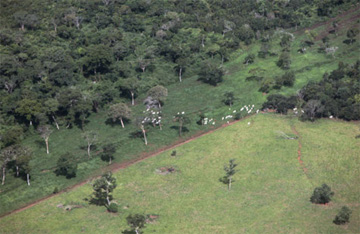June 12, 2009
Brazil's three largest supermarket chains, Wal-Mart, Carrefour and Pão de Açúcar, will suspend contracts with suppliers found to be involved in Amazon deforestation, reports O Globo.
The decision, announced at a meeting of the Brazilian Association of Supermarkets (Abras) this week, comes less than two weeks after Greenpeace's exposé of the Amazon cattle industry. The report, titled Slaughtering the Amazon [], linked some of the world's most prominent brands — including Nike, Toyota, Carrefour, Wal-Mart, and Johnson & Johnson, among dozens of others — to destruction of the Amazon rainforest for cattle pasture.
A statement from Abras said the association would develop guidelines and allow independent auditing to ensure that cattle products were not sourced from illegally cleared Amazon lands. Abras said the move is necessary because there is no "guarantee that the meat does not come from deforested areas in Amazonia."
 Cattle and rainforest in the Brazilian Amazon. Photo by Rhett A. Butler |
Greenpeace welcomed the developments.
"This is an important first step towards winning a halt to further deforestation for cattle in the Amazon," stated the NGO on its blog.
Cattle ranching is the biggest driver of deforestation in the Brazilian Amazon, accounting for roughly 80 percent of forest clearing. More than 38,600 square miles has been cleared for pasture since 1996, bringing the total area occupied by cattle ranches in the Brazilian Amazon to 214,000 square miles, an area larger than France. The legal Amazon, an region consisting of rainforests and a biologically-rich grassland known as cerrado, is now home to more than 80 million head of cattle, more than 85 percent of the total U.S. herd.
Nenhum comentário:
Postar um comentário